The Latest Healthcare News
Check out our blog to learn more from our team about the latest medical advancements, health tips, and primary care news.

If you’re experiencing diarrhea, vomiting, and fever, you may be suffering from food poisoning. At AllCare, our expert team of medical professionals can offer a precise diagnosis and personalized treatment plan, prioritizing your well-being and providing prompt, effective relief from your food poisoning symptoms.

Food poisoning, also known as foodborne illnesses, can happen to anyone who consumes contaminated food or water containing harmful organisms like bacteria, viruses, or parasites. As your body tries to purge the toxins, you may experience symptoms like nausea, vomiting, diarrhea, and sometimes fever. Food contamination can happen at any stage of the production process, from harvesting to storage or preparation to cooking. And even with sanitary food practices, there may still be a small amount of contamination in your food. Depending on the amount of contamination, your immune system may not be able to fend off this type of infection.
Also called: Foodborne illness, foodborne infection, stomach bug
Food poisoning symptoms can begin within hours—or sometimes days—of eating contaminated food. While most cases are mild, some can be serious or lead to dehydration. Symptoms may vary based on the germ or toxin involved. Common symptoms of food poisoning include:
Testing for food poisoning is important if severe symptoms occur or symptoms persist for several days. Testing can help identify the specific bacteria, virus, or toxin responsible, enabling targeted treatment and preventing complications.
Medically reviewed by AllCare Primary & Immediate Care
The timing depends on the type of infection. Some bacterial toxins can make you sick within a few hours, while others need more time to grow in your system before causing symptoms. In some cases, you might feel ill within a few days, but for certain infections, it can take weeks to show up.
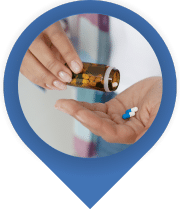
If your food poisoning is caused by bacteria, you may be prescribed an antibiotic. If it’s caused by a parasite, an antiparasitic is usually prescribed. Your physician may also recommend a probiotic, which can replace healthy bacteria in the digestive tract. Over-the-counter (OTC) medications for diarrhea and nausea may also be recommended for adults who are not experiencing a fever or bloody diarrhea.
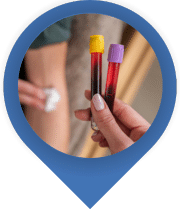
If we believe the infection has spread to the blood, blood tests may be performed. These tests can identify Listeria monocytogenes, which require antibiotics to treat, and hepatitis A, which is inflammation of the liver.
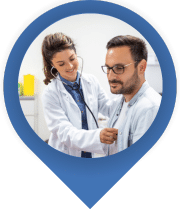
Our healthcare professionals will provide a complete medical exam that includes your symptoms, health history, food intake, and any recent travel.

For patients experiencing dehydration from food poisoning, fluid replacement therapy can quickly restore fluid levels and electrolytes lost during bouts of diarrhea or vomiting.
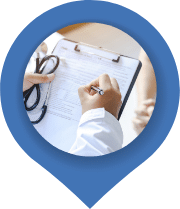
We may request a stool sample, which will then be sent to a lab to look for bacteria, viruses, or germs. This test can help determine the cause of your digestive issues and if you are suffering from food poisoning.
While there are hundreds of specific types of food poisoning, some of the common ones include:
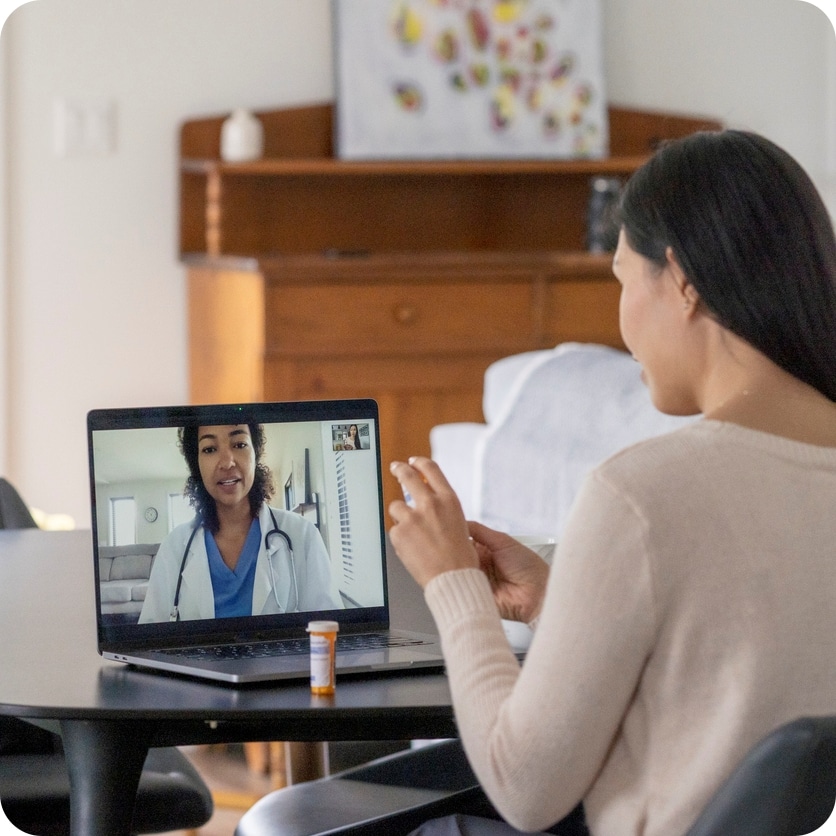
Experience the convenience of telehealth appointments at AllCare. Our telemedicine services are designed to provide you with seamless access to healthcare without the need to leave your home. Whether you need an online doctor’s appointment for immediate or primary care, AllCare’s got you covered. With our online telehealth services currently available to individuals located in Virginia, Maryland, and Washington, D.C., you can connect with our experienced immediate and primary care physicians via secure video calls.
At AllCare, we are expanding our virtual healthcare access to all services previously offered in person. This includes:
Getting diagnosed and treated for food poisoning is as easy as scheduling an appointment at AllCare, but you can also see a primary care doctor at our facilities on a walk-in visit if needed. Here are a few simple steps for getting treated for food poisoning:
Certain foods are more prone to contamination due to how they are grown, processed, or prepared. Common culprits include:
Yes, some types of food poisoning can be highly contagious. Norovirus, for example, is easily spread through direct contact, touching contaminated surfaces, or consuming food prepared by an infected person. Practicing good hygiene, like washing hands thoroughly and cleaning surfaces, helps reduce the risk of spreading foodborne illnesses.
The duration of food poisoning depends on the contaminant.
Recovering from food poisoning requires a gentle approach to eating to avoid further irritation. Start by staying hydrated with plenty of water, oral rehydration solutions, or clear broths to replace fluids lost from vomiting or diarrhea. Gradually introduce easily digestible foods such as plain rice, bananas, applesauce, toast, and crackers. Avoid spicy, fatty, or dairy-heavy foods until your symptoms have fully subsided. To help restore gut health, consider incorporating yogurt with live cultures or other probiotic-rich foods into your diet.
Seek medical attention if you experience any of the following:
Early diagnosis and treatment can prevent complications and promote a faster recovery.
At AllCare, we’re proud to deliver exceptional primary and immediate care to residents across Virginia, Maryland, and Washington D.C. From bustling city centers to serene suburban neighborhoods, our clinics are strategically placed for your convenience and care. Experience top-tier food poisoning treatment in your community with AllCare, where your health is our priority.
Check out our blog to learn more from our team about the latest medical advancements, health tips, and primary care news.
Seasonal Affective Disorder (SAD) represents a significant mental health concern affecting approximately 5% of adults in the United States. This […]
Read More >Mammograms save lives. Early detection of breast cancer through proper screening will give a patient a remarkable 99% five-year survival […]
Read More >Most people are aware that diet, exercise, and genetics affect cholesterol levels. But can stress raise your cholesterol? The answer […]
Read More >Our related healthcare services extend beyond immediate care to include preventive care such as routine physical exams, chronic disease management for conditions like diabetes, and specialty care referrals for more complex health issues.